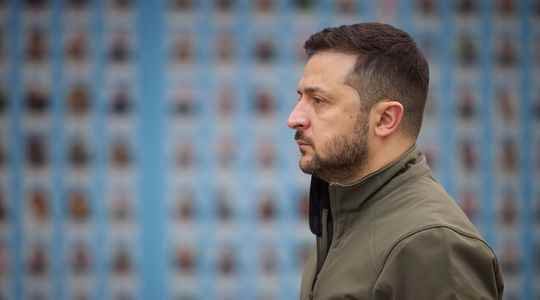A large-scale Russian offensive, launched on Wednesday, November 23, again led to dangerous water and electricity cuts in kyiv, while temperatures continue to drop. The cuts also continue in the rest of the country, in particular in Kramatorsk (east), Lviv (west) or Kharviv (north-east).
According to the Ukrainian Air Force, Russia fired around 70 cruise missiles at Ukraine on Wednesday, 51 of which were shot down, and sent five suicide drones. They targeted strategic infrastructure as winter temperatures set in in Ukraine. At least six people died in these strikes and several others injured. The previous night, a maternity ward had been bombed by the Russians, causing the death of a newborn baby.
Another direct consequence of these Russian strikes, Moldova, already plagued by major energy problems caused by the war in Ukraine, was the victim of “massive power outages”, deplored its Deputy Prime Minister, Andrei Spinu.
The spokesman for the Russian presidency, Dmitry Peskov, reacted to these strikes on Wednesday by indicating that the Kremlin did not doubt the “success” of its offensive in Ukraine, despite the setbacks of recent months on the ground.
The United States meanwhile announced $400 million in new military aid to Ukraine for additional weapons, ammunition and air defense equipment. The UK has sent a first Sea King helicopter and plans to provide two more.
- Zelensky denounces “war crimes” before the UN
“With temperatures below zero, several million people without energy supply, without heating and without water, this is obviously a crime against humanity”, denounced President Zelensky during a brief declaration before the UN, during an emergency meeting of the Security Council that he himself had called for a few hours earlier.
Nine months after the Russian invasion of his country on February 24, President Zelensky denounced the “formula of terror” imposed by the armed forces of Moscow. Faced with a powerless UN Security Council, he felt that the international community could “not be held hostage by an international terrorist state”, referring to Moscow’s right of veto which blocks any resolution against the Russian aggression in Ukraine.
French UN Ambassador Nicolas Rivière called the Russian strikes a “manifest violation of international humanitarian law”. The European Parliament had qualified a few hours earlier Russia as a “State promoter of terrorism”, during a vote almost nine months to the day after the start of the invasion. The European Parliament then announced that its website had been the target of a cyberattack claimed by a “pro-Kremlin group”.
- Three disconnected nuclear power plants
Three Ukrainian nuclear power plants were “disconnected” from the electricity grid on Wednesday after Russian strikes caused massive power outages, the national operator, Energoatom, announced. “Due to a drop in frequency in the Ukrainian energy system, the emergency protection system was activated at the Rivne, Pivdennoukrainsk and Khmelnitsky nuclear power plants, which led to the automatic disconnection of all generating units” , Energoatom said on Telegram.
According to the Ukrainian operator, “the level of radiation at the sites and adjacent territories has not changed” and “all indicators are normal”. “As soon as the operation of the electrical system is normalized, the supply of electricity from the nuclear power plant will resume,” Energoatom said.
The operator also indicated that the supply of the Zaporijjia nuclear power plant, the largest in Europe, located in southern Ukraine and occupied by Russian forces, had been stopped from the Ukrainian network.
READ ALSO >> Yachts, villas, helicopters… Behind the scenes of the difficult hunt for Russian oligarchs
That of Pivdennooukraïnsk, in the South, had also been affected by a strike which fell a few hundred meters from the power station in September.
French President Emmanuel Macron announced on Wednesday that he would have “direct contact” with his Russian counterpart Vladimir Putin “in the coming days”, in particular on Ukrainian civil nuclear power, a source of concern. But Mr Peskov said there was currently “no agreement” or “concrete proposal” on such a telephone interview.
Despite still violent fighting, particularly in the East, Moscow and kyiv continue to exchange prisoners of war. “Another exchange took place today with kyiv according to the formula 35 for 35,” said Wednesday a senior leader of the Russian occupation authority, Denis Pushilin.
The freed Ukrainian prisoners are “22 national guards, eight border guards, four navy soldiers, a guy from the armed forces” and also a civilian “amputated” with a leg, specified the chief of staff of the Ukrainian presidency, Andrii Iermak.
